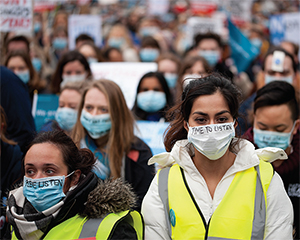
© John Gomez / shutterstock.com
Editor’s note: Physicians are increasingly frustrated with various regulations, requirements, and other activities that have impacted their satisfaction with the practice of medicine. They, and particularly those who are hospital or health system employees, feel that they are no longer in control of their destinies, and physician burnout is on the rise.The following article discusses the “nuclear option” of a physician strike, a proposition I and most others find incredibly repugnant. However, I think it is important that the subject to be discussed given the current environment.–Robert Miller, MD, Editor
Explore This Issue
February 2017
Junior doctors in the United Kingdom have spent several years fighting for a new contract with the British National Health Service (NHS). Four work stoppages—one-day strikes—took place in early 2016. Last fall, the plan was to ramp up the stoppages with longer-lasting actions. But the series of five-day strikes was called off due to concerns over patient safety, according to the BBC.
Should physicians, including otolaryngologists, be allowed to strike? A trio of experts told ENTtoday that the answer is more nuanced than a simple “yes” or “no.”
“As much as the role of the physician has evolved over the past few decades to become something more of a transactional relationship with patients, I think the vast majority of physicians would agree that they still have an ethical obligation to provide at least emergency services at all times,” said Ryan Hoskins, MPA, MD, a family and emergency department doctor in Canada who has written about physician strikes. “Doctors, however, should be allowed to conduct job action.”
Those actions shouldn’t involve “a full withdrawal of services,” but should recognize that physicians have the rights of workers in other fields that provide essential services, such as police and firefighters. “Like any other profession, they should have as a negotiating tool the ability to have some form of collective action if they feel they are mistreated,” he said. “But it is a decision that must be taken perhaps with more weight than in jobs outside of healthcare.”
Ethics 101
One of the first questions to ask about whether or not a physician can strike involves its impact on the Hippocratic oath. Even if the law says a physician can strike, his or her moral and ethical responsibilities to a patient must be paramount, said David Kemp, a lawyer who writes on medical ethics. “For physicians to ethically engage in organized work stoppage, they must first exhaust all other avenues of negotiation,” he says. “It’s my view that, due to the unique nature of the doctor–patient relationship, [physicians] must also take all necessary steps to safeguard the welfare of patients before engaging in any type of organized work stoppage.”